

Tao Te Ching
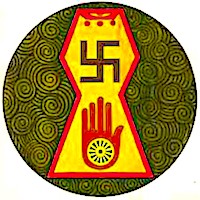
Jain Dharma Lineage
An ancient religion of non-violence and respect towards all living beings, Jainism (one of the few religions without a creator god) evolved as a philosophy and practice based on the idea of self-conquering—overcoming all the inner passions like anger, pride, greed, attachment, fixation, and desire in general. It emphasizes self-discipline to the extent of asceticism, non-violence, not becoming seduced by either conceptual absolutism or physical materialism and possessiveness. Jainism—with a foundational principle expressed by the phrase, "the function of souls is to help one another”—developed the idea of non-violence toward all sentient beings in nature, political, personal, and everyday life to a degree probably beyond any other tradition in history. “Many-sidedness,” the second main Jain principle, goes beyond the yin-yang of Taoism and became a kind of Eastern Skepticism positing not only and always two possibilities but at least seven.
People (7)
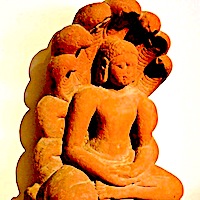
Parshvanatha
872 – 772 BCE
Earliest historical Jain saint
23rd described and earliest historical Jain tirthankaras (savior/saint teachers), Parshvanatha—like the Buddha—was born to a king and queen but renounced the world’s fame and fortune in favor of a life dedicated to spiritual discovery. His realizations and teachings became not only a major influence on the Jain tradition; but also, Indian philosophy in general. The core of his teachings emphasized understanding the cause-and-effect principles of karma and samsara while practicing non-violence and asceticism. His statures usually have a serpent hood over his head or snakes sprouting out of his shoulders. According to Joseph Campbell, snakes in this context are a symbol for life and represent letting go of habitual patterns, beliefs, and prejudice like a snake discards its skin.
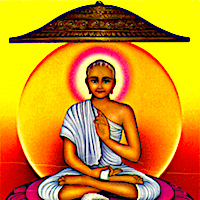
Mahavira (Vardhamāna)
540 – 468 BCE
"the great hero”
Reviver of the Jain tradition, 24th tirthankara, contemporary of the Buddha, and—like the Buddha—Mahavira left the wealth and power of his royal family to go on a spiritual quest. After 12 years of intense and ascetic meditation, he realized enlightenment and began a 30-year period of teaching. These teachings became some of the most important foundations of Jainism. The two major Jain sects differ in their understanding of Parshvanatha and Mahavira’s teachings. One believes their is no difference, the other that Mahavira expanded the scope of non-violence and began requiring monastic celibacy. HIs death and nirvana have become one of India’s most important holidays, the Diwali festival of lights.
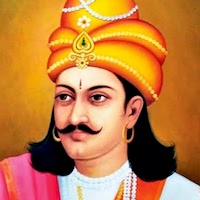
Chandragupta Maurya
340 – 297 BCE
Ashoka’s grandfather, founder of the Maurya Empire
Born poor, orphaned, and abandoned; Chandragupta became founder of the Maurya Empire, a major change agent for Indian history, and builder of one of the subcontinent’s largest empires. After reaching the heights of power, fame, and wealth; he renounced everything and became a Jain monk. He unified India after Alexander the Great left a legacy of multiple territories ruled by Indo-Greek rulers; and, Ashoka’s grandfather, he began many of the economic and political reforms Ashoka later expanded and perfected. Under his rule, trade and agriculture flourished, infrastructure like roads, mines, and irrigation expanded, the economy grew very strong, and numerous religions spread. His renown continues into modern times through books, plays, television, movies, and even an Indian Postal Service stamp.
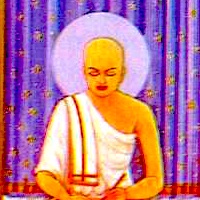
Aacharya Haribhadra Suri
459 – 529 CE
Apostle of many-sided view
Philosopher, Jain leader, and prolific author of over 100 books including some of the most respected texts of the Jain tradition; Haribhadra promoted the ideal of anekāntavāda—epitomized by the parable of the blind men and elephant. He taught that whenever we take a partial, unconditional view of reality and won't accept contrary views, our reality becomes distorted. He respected and studied many traditions, promoted religious pluralism, and included the insights of other religions in his own teachings. He does conclude though that all the other traditions besides Jainism become confused by one-sided views.
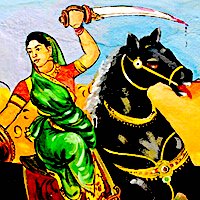
Abbakka Chowta (Rani Abbakka Chowta)
504 – 573 CE
First Indian, woman freedom fighter
“The fearless queen,” Jain sage, warrior, and “first woman freedom fighter of India;” Abhaya Rani was one of the first to resist European colonial attacks. She skillfully fought against the Dutch and British as well as preventing the Portuguese from capturing Ullal several times. Along with fellow Jains, she included Hindus and Muslims in her administration, people from all sects and castes in her armies. Betrayed by an estranged husband, she was finally captured and imprisoned; but, she didn’t give up, broke out, and died fighting. More than 500 years now after her life, she is still revered and celebrated throughout India with stamps, statues, roads, ocean vessels, and festivals named after her.
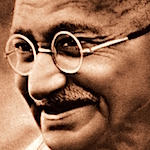
Mahatma Gandhi
1869 – 1948 CE
Mahatma Gandhi (1869–1948)
Leader of India’s independence movement, non-violent civil disobedience advocate, major inspiration for Martin Luther King Jr. and Nelson Mandela; Gandhi followed in his Jain tradition of fasting, meditation and vegetarianism. After an arranged marriage at 13, he studied law in England but was so introverted and shy, he froze during his first cross-examination and couldn’t say anything. Not being able to find work in India, he moved to South Africa where in a Rosa-Parks type moment was thrown off a train for refusing to move to the back. This led to his lifetime passion for fighting prejudice, discrimination, and injustice – political change in S. Africa, Indian independence, and many attempts to establish peace between Hindus and Muslims.

Manoj Jain
1963 CE –
Author, infectious disease doctor, and local politician; Manoj Jain has taken a lead in the usa COVID-19 response. He writes articles for publications like the New York Times, Washington Post, NPR, and The Huffington Post as well as books on fundamentalism, non-violence, infectious diseases, and a biography on the Jain Saint, Mahavira.
Related Sources (0 sources)
Quotes about the Jain Dharma Lineage (1 quotes)
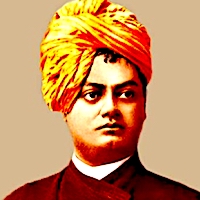
“The Buddhists or the Jains do not depend upon God; but the whole force of their religion is directed to the great central truth in every religion, to evolve a God out of man. They have not seen the Father, but they have seen the Son. And he that hath seen the Son hath seen the Father also.
”
Comments: Click to comment
Comments (0)